Physical Address
304 North Cardinal St.
Dorchester Center, MA 02124
Physical Address
304 North Cardinal St.
Dorchester Center, MA 02124
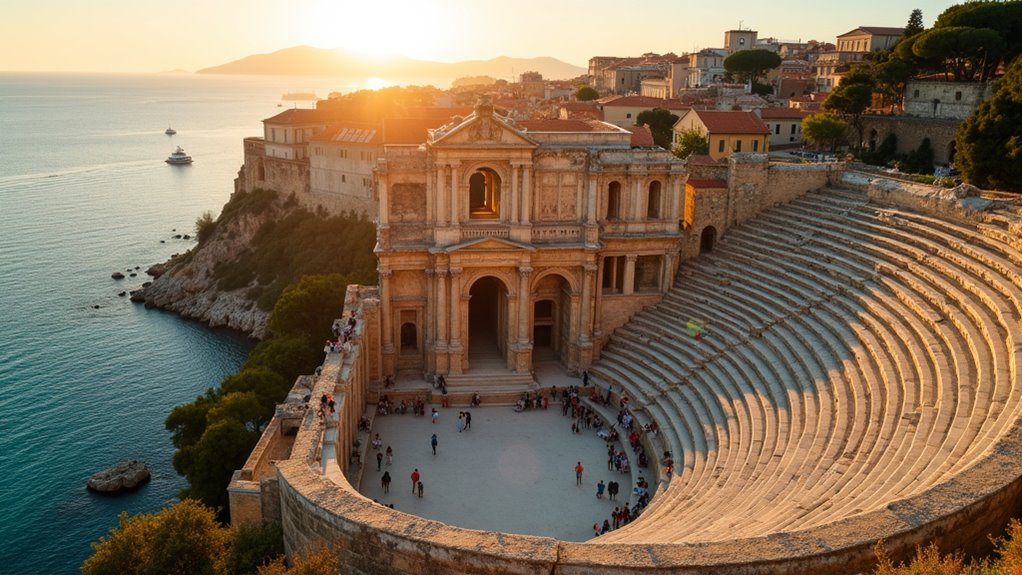
Uncover Pula's rich Roman heritage, pristine beaches, and local delicacies while discovering why this Adriatic gem deserves your attention.
Pula is absolutely worth visiting for its spectacular Roman amphitheater, pristine beaches, and growing off-season appeal. You’ll find fantastic hiking trails, vibrant cultural festivals, and exceptional local cuisine featuring Istrian prosciutto and Malvasia wines. The city serves as an ideal base for exploring Istria and nearby islands, while embracing eco-friendly initiatives like solar projects and green infrastructure. Discover seven compelling reasons that make this Adriatic gem a must-see destination.
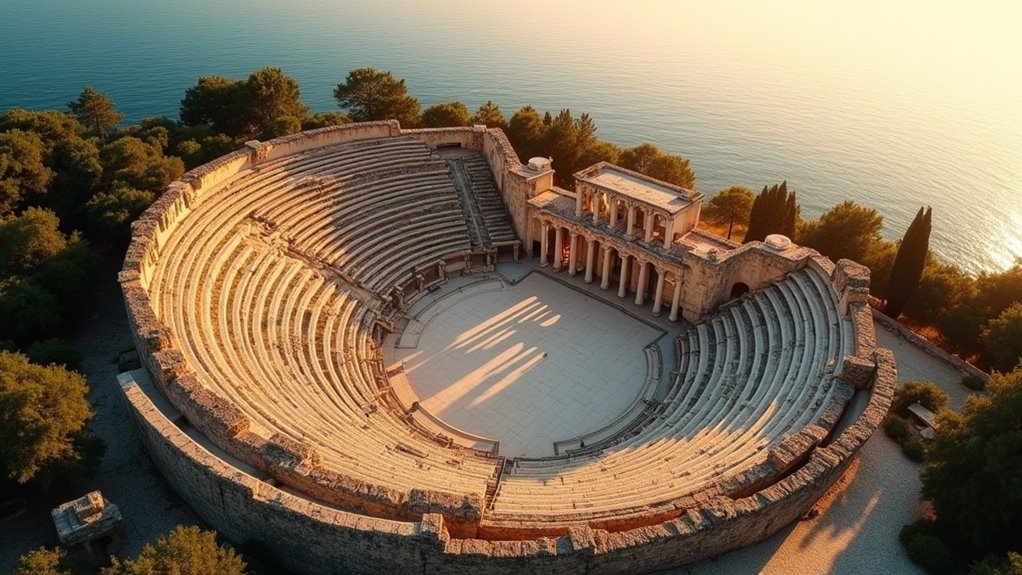
When you step into Pula, you’re literally walking through living Roman history. The Pula Arena functions as one of the world’s best-preserved Roman amphitheaters, once hosting gladiatorial contests and now showcasing cultural performances. Built with local Istrian limestone, this impressive structure featured complex systems for rainwater collection and could accommodate up to 23,000 spectators.
Don’t miss the Temple of Augustus, built between 2 BC and 14 AD. Despite WWII damage, this restored temple now houses ancient sculptures after serving as both a church and granary throughout history.
For less-traveled gems, visit the Gate of Hercules, Pula’s oldest Roman archway featuring Hercules’ head carvings, or discover the Small Roman Theater behind the Archaeological Museum. This 1st-century structure once seated 5,000 spectators—Pula’s entire population at that time.
The Arch of the Sergii, Twin Doors, Forum, and remaining city walls complete your journey through Pula’s remarkable Roman urban landscape.
While Pula’s ancient architecture tells the story of its past, its natural landscapes invite you to create adventures of your own. Cape Kamenjak’s rugged peninsula offers hidden coves perfect for snorkeling, kayaking, and cliff diving into crystal-clear waters.
Beyond ancient stones lies a wilder Pula, where Cape Kamenjak’s hidden coves beckon adventurous souls to dive into crystalline depths.
The Lungomare Promenade connects a string of colorful beaches and secluded inlets along its 5km path. Brijuni National Park’s archipelago awaits just a short boat trip away, offering sightseeing opportunities to explore Roman ruins on the island.
For hikers, trails through Šijana Forest and around the coastal cliffs provide both shade and panoramic sea views.
Don’t miss Limski Fjord’s narrow 12km estuary, where you can sample fresh oysters after a boat tour. Similar to the Dalmatian Coast regions, Pula offers an impressive blend of natural beauty and historical significance.
Active travelers will appreciate the limestone caves, fossil sites, and diverse Mediterranean flora that make Pula a natural playground beyond its historical significance.
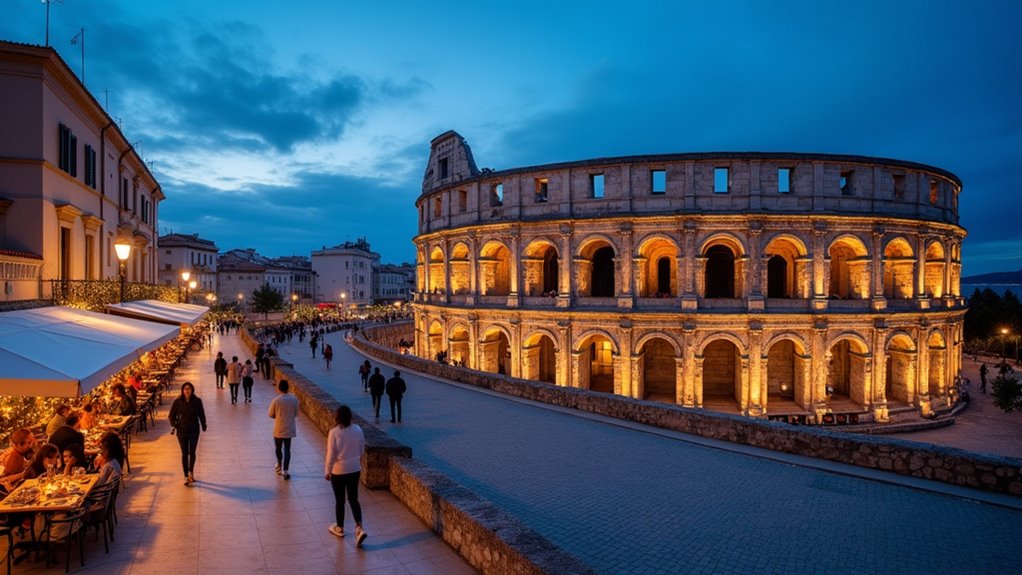
Pula’s seasonal magic extends far beyond just the summer months, transforming into a year-round destination that’s increasingly popular even during winter. Recent statistics show an 8% increase in overnight stays and a 10% rise in tourist arrivals during the early months of the year.
You’ll find yourself among primarily Croatian visitors during winter, with Slovenians forming the largest international group. The growth in tourism has attracted visitors from various countries, with Austrian travelers showing a remarkable 132% increase in overnight stays compared to previous years. The city’s Advent festivities have seen remarkable growth, with attendance jumping 72% in 2024.
Pula’s mild Mediterranean climate makes winter exploration comfortable, allowing you to visit historical sites without summer crowds. Unlike Russia’s wilderness with its dangerous predators, Pula offers safe natural exploration year-round for wildlife enthusiasts. The growing off-season tourism has boosted the local economy, creating more jobs and attracting investment.
Whether you’re seeking cultural events or peaceful sightseeing, Pula delivers year-round appeal that continues to strengthen annually.
Beyond its ancient ruins and seaside charm, the cultural scene in Pula pulses with creativity and energy throughout the year. The city’s crown jewel, the Roman amphitheater, transforms into one of the world’s most spectacular performance venues, hosting everything from the historic Pula Film Festival to concerts by international artists.
Pula’s ancient architecture transforms into vibrant cultural spaces, where history and modern artistry collide spectacularly.
You’ll discover a prosperous tapestry of cultural events that showcase why Pula has earned its reputation as a cultural hotspot:
The stunning Visualia Festival turns the entire city into a luminous art canvas with impressive light installations that highlight both modern creativity and ancient architecture.
Like Zadar’s famous Sea Organ, Pula offers visitors a blend of traditional Croatian heritage and innovative cultural attractions.
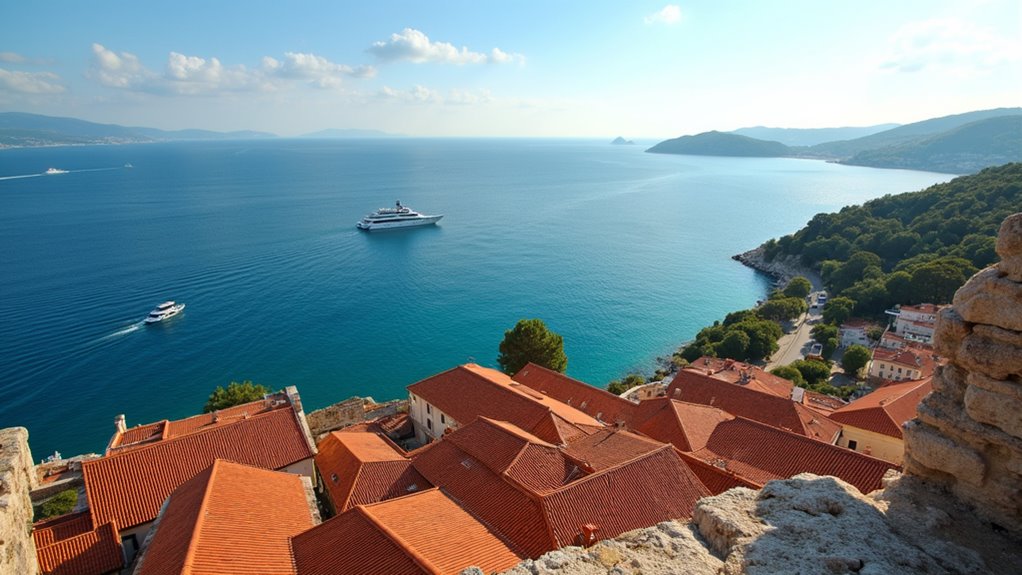
The strategic positioning of Pula at the southern tip of Croatia’s Istrian Peninsula makes it an exceptional base for Adriatic exploration. You’ll enjoy direct access to stunning coastal routes with panoramic views from the city’s seven hills.
Pula serves as the Adriatic’s northernmost deep-water port, connecting you to 79 Croatian islands and coastal cities. Take a 3-hour ferry to Venice or hop on shorter boats to the Brijuni Islands National Park just 15km north.
Within a 90-minute drive, you can reach charming towns like Rovinj, Poreč, and Motovun. The city sits on the same land once controlled by the Venetian Republic from 1331 to 1797, offering a rich historical backdrop to your travels. The city’s modern infrastructure includes Pula Airport with flights to 20+ European destinations, well-maintained coastal highways, and plenty of transportation options for island-hopping adventures. Best of all, Pula offers a great value experience with lower costs than many other Croatian coastal destinations.
Recognized among the world’s 100 most sustainable destinations in 2022, Pula demonstrates a genuine commitment to eco-friendly tourism that you’ll notice throughout your visit. The city has earned international recognition, including the Friend of the Sea Sustainable Award for its marine conservation efforts.
You’ll appreciate Pula’s green approach through:
The city’s all-encompassing sustainability plan continues through 2025, with ongoing solar panel initiatives and energy-efficient renovations. Pula has also implemented innovative rainwater gardens and green stormwater drainage systems throughout the urban area. Unlike many Eastern European cities, Pula maintains its affordability while investing significantly in sustainable infrastructure.
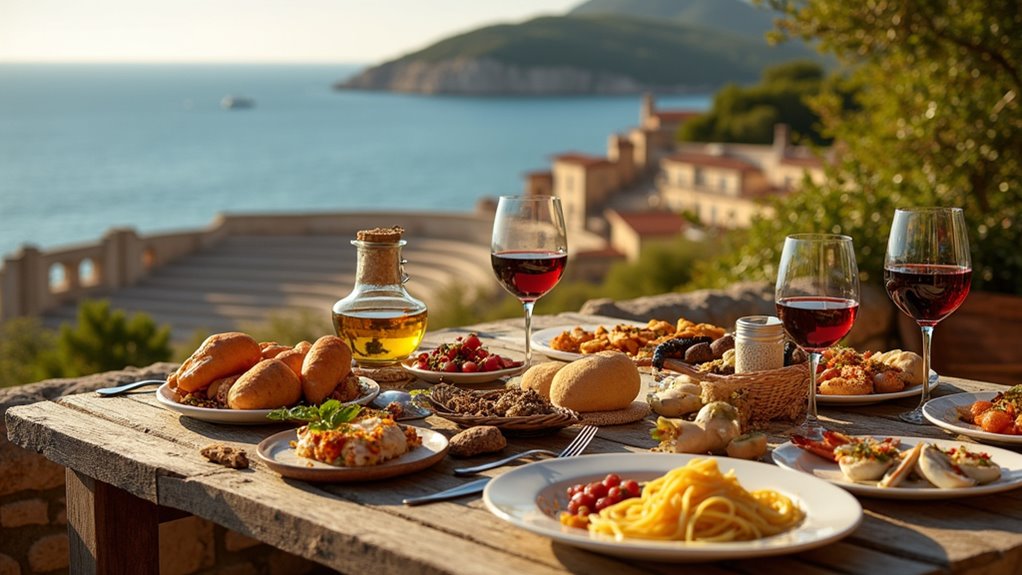
Savoring Pula’s culinary scene might be one of your most memorable Croatian experiences, as the city brilliantly showcases Istria’s gastronomic heritage. You’ll find a delicious blend of Mediterranean and Italian influences reflected in local specialties like Istrian ham, truffle-infused dishes, and fresh Adriatic seafood. This regional cuisine represents some of the most iconic European dishes that demonstrate the continent’s rich culinary diversity.
Istrian prosciutto, not smoked, distinguishes itself from other varieties and is carefully produced at least 12 km from the coast to maintain its protected geographical status.
Don’t miss signature dishes such as crni rizot (black squid ink risotto) and buzara (shellfish cooked in wine). Traditional konoba-style taverns like Boccaporta and TAJ offer authentic settings to enjoy these flavors.
Istria’s renowned wines, particularly the crisp Malvasia Istriana, perfectly complement your meals. Consider joining a wine tour to explore nearby vineyards where you’ll learn about production methods and sample premium local varieties directly from producers.
Pula isn’t just worth visiting—it’s essential for anyone craving authentic Croatian experiences. As you stand beneath the colossal arches of the amphitheater with golden Mediterranean sunlight filtering through, you’ll understand why. From ancient Roman ruins to secluded beaches and culinary delights, this coastal gem delivers experiences that’ll linger in your memory long after you’ve returned home. Don’t just consider Pula—prioritize it.